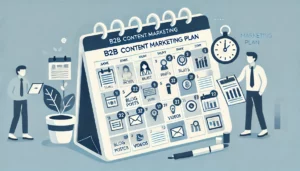B2B Marketing: Beyond Lead Generation

In the realm of B2B marketing, there is a common misconception that success is solely determined by the number of leads generated. While lead generation is undeniably important, a comprehensive B2B marketing strategy encompasses much more. It’s about nurturing relationships, supporting the sales team, keeping leads warm, and several other critical components. This blog explores the broader aspects of B2B marketing that contribute to long-term business success.
Nurturing Relationships
B2B marketing is fundamentally about building and nurturing relationships with potential clients. Unlike B2C transactions, B2B deals often involve longer sales cycles and higher stakes, making trust and relationship-building essential.
Building Trust with Potential Clients
Effective B2B marketing strategies focus on establishing trust with potential clients. This involves consistent communication, providing valuable content, and demonstrating expertise. When clients trust your brand, they are more likely to engage and eventually convert.
Long-Term Relationship Development
Relationship marketing goes beyond initial engagement. It’s about maintaining and strengthening relationships over time. By staying connected with prospects through personalized emails, follow-ups, and targeted content, businesses can foster loyalty and long-term partnerships.
Benefits of Relationship Marketing
Relationship marketing leads to higher customer retention rates and increased lifetime value. Satisfied clients are more likely to refer your services to others, creating a cycle of continuous growth and engagement.
Supporting the Sales Team
Another critical aspect of B2B marketing is its role in supporting the sales team. Marketing and sales alignment can significantly enhance the efficiency and effectiveness of the sales process.
Providing Sales with Qualified Leads
B2B marketing efforts focus on generating not just leads, but qualified leads. By using lead scoring and segmentation, marketing teams can provide the sales team with prospects that are more likely to convert, increasing the efficiency of the sales process.
Shortening the Sales Cycle
Effective B2B marketing strategies help in educating and nurturing leads before they reach the sales team. This pre-qualification process means that by the time leads are handed over to sales, they are more informed and ready to make a decision, thus shortening the sales cycle.
Enhancing Sales and Marketing Alignment
When marketing and sales teams work together, they can share insights and strategies, leading to better-targeted campaigns and a cohesive approach to client acquisition. This alignment enhances overall business performance and client satisfaction.
Keeping Leads Warm
In B2B marketing, the journey from lead generation to conversion can be lengthy. Keeping leads warm is crucial to ensure they remain engaged and interested in your solutions.
Continuous Engagement Strategies
Maintaining regular communication with leads through email marketing, newsletters, and social media keeps your brand top of mind. Providing valuable content and updates ensures that leads continue to see the relevance and benefits of your offerings.
The Role of Content Marketing in Nurturing Leads
Content marketing plays a vital role in nurturing leads. By creating and distributing valuable, relevant, and consistent content, businesses can attract and retain a clearly defined audience. Blog posts, whitepapers, webinars, and case studies help educate leads and move them further down the sales funnel.
Importance of Lead Scoring and Segmentation
Lead scoring and segmentation help in prioritizing and targeting leads based on their level of interest and engagement. This ensures that your marketing efforts are focused on leads that are most likely to convert, enhancing efficiency and effectiveness.
Strengthening Brand Authority
B2B marketing isn’t just about generating leads; it’s also about establishing and maintaining brand authority. A strong brand presence can significantly influence purchasing decisions.
Establishing Thought Leadership
Thought leadership involves sharing insights and expertise that provide value to your audience. By consistently publishing high-quality content, participating in industry events, and engaging in thought-provoking discussions, businesses can position themselves as leaders in their field.
Consistent Brand Messaging
Consistent messaging across all marketing channels helps reinforce your brand identity and values. This consistency builds trust and recognition, making it easier for potential clients to remember and choose your brand.
Building Credibility and Trust
Trust is a critical factor in B2B relationships. By delivering on promises, providing excellent customer service, and maintaining transparency, businesses can build and sustain credibility. A credible brand is more likely to attract and retain clients.
Enhancing Customer Experience
B2B marketing also plays a crucial role in enhancing the overall customer experience. A positive customer experience leads to higher satisfaction, loyalty, and advocacy.
Personalized Marketing Approaches
Personalization involves tailoring marketing messages and offers to meet the specific needs and preferences of individual clients. Personalized marketing shows clients that you understand and value their unique challenges and requirements, leading to stronger connections.
Using Feedback to Improve Strategies
Collecting and analyzing feedback from clients helps in refining your marketing strategies. Understanding what works and what doesn’t allows you to make informed decisions and continuously improve your marketing efforts.
Building Loyalty and Advocacy
Satisfied clients are more likely to become loyal advocates for your brand. By nurturing these relationships and providing exceptional value, you can turn clients into promoters who recommend your services to others, driving organic growth.
Leveraging Data and Analytics
In the realm of B2B marketing, data and analytics are invaluable for making informed decisions and optimizing strategies. By tracking and analyzing lead behavior, businesses can gain insights that go beyond simple lead counts.
Tracking and Analyzing Lead Behavior
Monitoring how leads interact with your content, website, and emails provides valuable information about their interests and needs. Tools like Google Analytics, CRM systems, and marketing automation platforms help track these interactions and build a comprehensive view of lead behavior.
Using Insights to Refine Strategies
Data-driven insights enable businesses to refine their marketing strategies. By understanding which tactics are most effective, companies can allocate resources more efficiently and focus on high-impact activities. Continuous analysis and adjustment based on data ensure that marketing efforts remain effective and relevant.
Measuring Marketing Effectiveness Beyond Lead Counts
While lead counts are important, other metrics such as engagement rates, conversion rates, and customer lifetime value provide a more comprehensive view of marketing effectiveness. These metrics help assess the overall impact of marketing efforts and guide strategic decisions.
Case Studies and Real-World Examples
Examining real-world examples of successful B2B marketing strategies can provide valuable insights and inspiration. Here are a few case studies that highlight the importance of looking beyond lead generation:
Company A: Building Long-Term Relationships
Company A implemented a relationship marketing strategy that focused on personalized communication and consistent engagement. By nurturing leads over time, they built strong relationships that resulted in higher customer retention and increased referrals.
Company B: Supporting the Sales Team
Company B aligned their marketing and sales teams to ensure a seamless lead handoff process. Marketing provided sales with detailed insights and qualified leads, which helped shorten the sales cycle and improve conversion rates.
Company C: Enhancing Brand Authority
Company C established thought leadership by regularly publishing industry insights and participating in webinars. Their consistent brand messaging and valuable content positioned them as a trusted authority, leading to higher brand recognition and credibility.
Conclusion
B2B marketing is about much more than generating leads. It involves nurturing relationships, supporting the sales team, keeping leads warm, strengthening brand authority, enhancing the customer experience, and leveraging data and analytics. By adopting a holistic approach to B2B marketing, businesses can achieve long-term success and build strong, lasting relationships with their clients. Embrace these strategies to move beyond lead generation and unlock the full potential of your B2B marketing efforts.
FAQs
1. Why is nurturing relationships important in B2B marketing?
Nurturing relationships helps build trust and loyalty with potential clients. Long-term relationships lead to higher customer retention, increased referrals, and stronger brand advocacy.
2. How does B2B marketing support the sales team?
B2B marketing supports the sales team by providing qualified leads, shortening the sales cycle, and enhancing sales and marketing alignment. This collaborative approach improves the efficiency and effectiveness of the sales process.
3. What strategies can keep leads warm in B2B marketing?
Continuous engagement through personalized emails, newsletters, and social media, as well as providing valuable content and updates, helps keep leads warm and interested in your solutions.
4. How can B2B marketing enhance customer experience?
Personalized marketing approaches, collecting and using feedback to improve strategies, and building loyalty and advocacy are key ways B2B marketing enhances the customer experience.
5. Why is it important to leverage data and analytics in B2B marketing?
Data and analytics provide insights into lead behavior, allowing businesses to refine strategies and make informed decisions. Measuring marketing effectiveness beyond lead counts helps assess the overall impact of marketing efforts.





